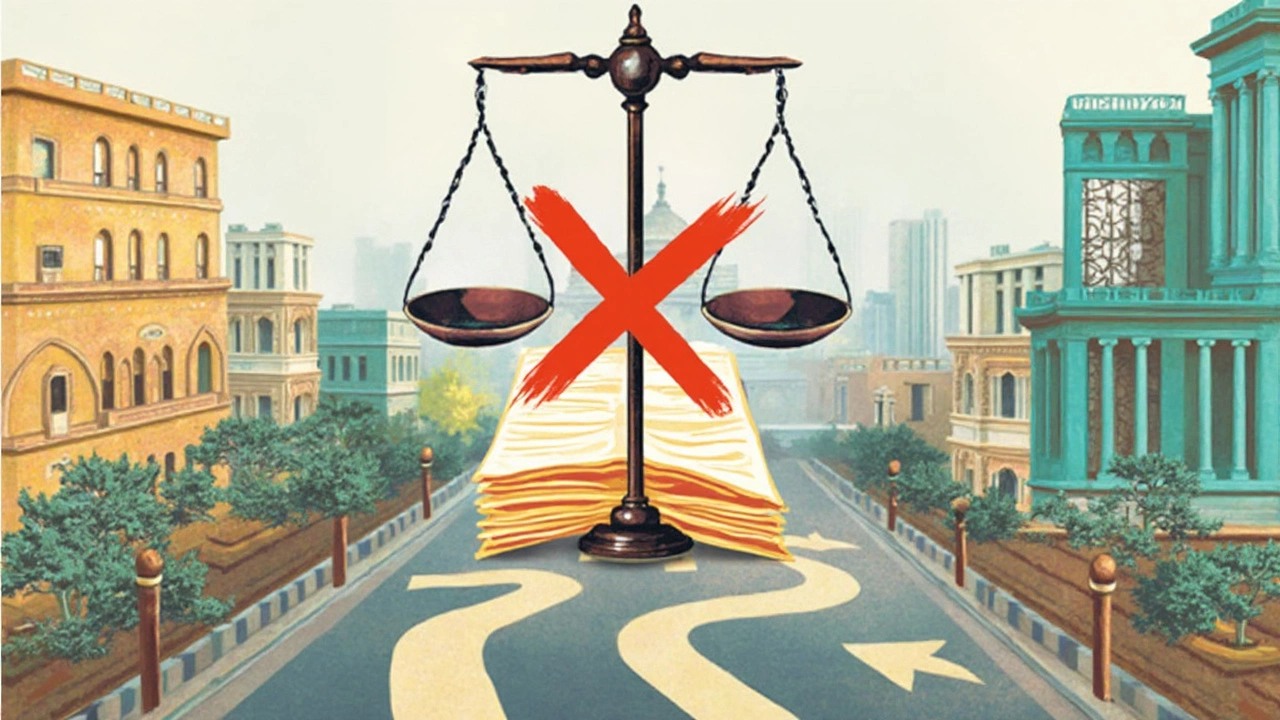Tough day in court? You walk out thinking the judge just wasn’t fair. Maybe you want to hit back with a lawsuit for bias. But here’s the blunt truth—suing a judge is almost never an option. Judges have something called judicial immunity, which protects them from being sued for most things they do in the courtroom. Crazy, right? This rule is there so judges can make tough calls without worrying about getting dragged to court by every unhappy party.
Still, that doesn’t mean judges get a free pass to do whatever they want. There are ways to push back if you think a judge was out of line, but it’s not through a direct lawsuit. Most people don’t realize the system has checks for bias—just not the ones you might imagine. Before you spend money on a lawyer or get ready to file paperwork, you need to know where the real lines are.
- How Judicial Immunity Works
- What Actually Counts as Bias
- When Judges Can Be Held Accountable
- Filing Complaints or Appeals
- Smart Next Steps If You Suspect Bias
How Judicial Immunity Works
If you’re thinking you can easily sue a judge for something that happened in court, here’s the harsh reality: judicial immunity is a real muscle, and it’s hard to get around. This rule means judges are usually safe from lawsuits about their decisions or actions in court—even if you think they’re being completely unfair or even rude.
Why does this exist? Judicial immunity is meant to let judges do their job without worrying that every ruling will land them in hot water. If judges had to keep one eye on the gavel and one eye on a possible lawsuit, a lot of rulings would get watered down, and nobody would want the job.
Here’s the catch: this immunity only covers actions taken while a judge is “on the bench”—in other words, anything connected to ruling on a case. If the judge is acting as part of their official duties, you usually can’t sue, no matter how bad or biased a decision feels.
- Making a ruling? Protected.
- Choosing what evidence to allow? Protected.
- Calling out a witness or scolding a lawyer? Still protected.
But—and this is a big but—judicial immunity does not cover stuff way outside the court’s business. Let’s say a judge physically harms someone in the hallway or commits a crime not related to a case; immunity won’t cover that.
Some folks are surprised to learn how deep these protections go. In a 2023 study, over 90% of lawsuits filed against judges got thrown out right away because of judicial immunity. So, if you’re genuinely considering whether you can sue a judge for bias in civil court, know this wall is tough to break through.
What Actually Counts as Bias
Just because a judge rules against you doesn’t mean they’re biased. Real judicial bias isn’t about hurt feelings—the law has a pretty high bar. You’ve got to show that the judge acted on personal prejudice or had a clear conflict of interest. Stuff like a judge not liking your lawyer, or just being grumpy in court, doesn’t cut it.
Here’s what might actually get labeled as judicial bias in a civil court case:
- The judge or someone in their family stands to benefit financially from the decision.
- The judge has a close relationship (positive or nasty) with one side in the case.
- The judge has said or done things that clearly show personal hatred or favoritism towards you or the other party, and not just one-off comments, but a pattern.
- The judge worked on your case before as a lawyer or has some personal involvement in the backstory.
If you can’t point to one of those, courts say there’s probably no actual bias. There’s a difference between disagreeing with a ruling and the judge acting unfairly due to personal reasons.
A 2023 survey from the National Center for State Courts found only about 4% of bias complaints against judges ended up being upheld after investigation. So, most feelings of bias don’t cross the legal line.
| Type of Bias | Usually Valid for Complaint? |
|---|---|
| Personal dislike | No |
| Financial interest | Yes |
| Friendly or hostile relation with party | Yes |
| Just disagreeing with judge’s ruling | No |
Bottom line: If you’re talking about suing a judge for bias, you need solid specifics, not just a vague feeling that the process was “unfair.”

When Judges Can Be Held Accountable
So, if judges usually can’t be sued, does that mean they’re above the law? Definitely not. There are rare situations where judges can be held accountable, but those cases look a lot different than what most folks expect. The key is knowing when a judge steps out of their official role.
Judicial immunity covers almost everything a judge does "on the bench." But if a judge totally steps out of bounds—like taking bribes, ruling on cases where they have a secret financial interest, or abusing their power outside of their official duties—then that’s a different story. In those cases, lawsuits and criminal charges can actually happen.
For example: a judge who accepts cash for a ruling can lose immunity and face prosecution. Back in 2008, two Pennsylvania judges landed in federal prison for accepting bribes. That's proof the system sometimes works, though it’s not exactly an everyday thing.
Here’s a quick breakdown of when a judge can be held accountable:
- Out-of-court actions: If a judge does something illegal when they’re not acting as a judge—like making threats or committing fraud as a private person—no immunity there.
- Cases of clear corruption: Bribery, fraud, or any sort of criminal behavior related to their position can make them personally liable.
- Administrative acts: Sometimes judges handle things like hiring or firing staff. If they discriminate or break employment law, that’s outside their "judicial acts."
The U.S. Supreme Court made this clear in the landmark case Stump v. Sparkman: "A judge will not be deprived of immunity because the action he took was in error, was done maliciously, or was in excess of his authority." In other words, just being wrong or unfair isn’t enough. There has to be real, provable misconduct.
"Judges are immune from lawsuits for their judicial acts, even when such acts are in excess of their jurisdiction, and are alleged to have been done maliciously or corruptly." — Chief Justice Warren E. Burger, United States Supreme Court
If you think a judge crossed the line, the usual move isn’t a sue a judge lawsuit—it’s reporting them to your state’s judicial conduct board, or even going public if the situation is serious. Civil and sometimes criminal penalties are possible in extreme cases, but it takes actual proof. For regular court mistakes or what feels like bias, the system expects you to go for an appeal, not a lawsuit.
Filing Complaints or Appeals
If you suspect judicial bias in your civil court case, a lawsuit against the judge won’t work—but you’re not stuck. The real-world moves are complaints or appeals. Let’s break them down so you know what actually helps.
The first route is a written complaint to your state’s commission on judicial conduct. Every U.S. state has one. These folks look into claims about judges acting unfairly or breaking ethical rules. Usually, you can file online or by mail, often with a simple form. For example, in California, the Commission on Judicial Performance reviews hundreds of complaints a year. Only about 2% lead to public discipline, but your voice does get heard.
Here's a quick rundown on how to file:
- Find your state’s judicial conduct commission website.
- Download or fill out their complaint form. Be clear, give dates, explain what the bias looked like.
- Attach all the evidence you’ve got—transcripts, orders, anything real.
- Submit it by mail or online, whatever their process is.
It's worth knowing what counts. You need to show the judge acted unfairly outside normal legal decision-making. Saying "the judge just didn't believe me" isn’t enough. Look for things like the judge making personal comments, ignoring key evidence, or breaking clear rules of procedure.
Another option: filing an appeal. If you lost your civil court case and think judicial bias wrecked your shot at justice, you (or your lawyer) can appeal the decision. This means a higher court reviews what happened. Appeals aren’t just about bias, but if you’ve got solid proof—a judge refused to hear key facts, or said something out of line—it goes in your arguments.
Arthur Hellman, a professor who’s written a lot about courts, puts it this way:
“Judicial immunity is almost absolute, but the judiciary is not above oversight. The appeals process and judicial conduct boards are there to keep judges honest.”
Getting actual results through complaints or appeals is rare, but real. Take this as a nudge: screens are watching what happens, and the record matters.
| State | Complaints Filed (2023) | Action Taken (%) |
|---|---|---|
| California | 1,200 | 2.1 |
| Texas | 950 | 1.9 |
| New York | 770 | 2.6 |
If you want change or at least a review, start with the complaint or get working on an appeal. Hardly quick or easy, but way more promising than suing a judge.

Smart Next Steps If You Suspect Bias
If you honestly think a judge was biased in your sue a judge or civil court case, don’t just let it slide. There are real actions you can take, and some could even change the course of your situation. Here’s what actually works if you’re worried about judicial bias:
- Request the judge to step aside (recusal). If the bias is obvious—like the judge is related to the other party or has a business tie—you or your lawyer can file a motion to have them recuse themselves. Judges actually do step back when there’s a solid reason, because staying on the case can hurt their reputation and decisions.
- File an appeal. If a judge’s behavior affected your case, you can appeal the decision. Appellate courts usually don’t care about small mistakes. They look for serious bias that really changed the outcome. You’ll need to point to exact moments in the record that show unfairness.
- Complain to the judicial oversight board. In every state, a judicial conduct commission investigates real complaints of bias, rudeness, or even flat-out misconduct. These boards don’t mess around when it’s serious. In 2021, over 150 judges across the U.S. got disciplined or removed for bad behavior. You file your complaint in writing, usually online or by mail.
- Get legal advice fast. Don’t go it alone, especially if you’ve lost property, money, or rights. A lawyer who knows civil court can help you look at evidence for bias and decide the best play—appeal, complaint, or something else.
- Stay cool and focus on facts. Judges don’t get disciplined just because someone disagrees with them, even in tough civil court cases. Always collect proof—court transcripts, rulings, or on-the-record stuff. Feelings won’t cut it, but actual evidence can go a long way.
Here’s a quick look at what happened across a few states last year when people took complaints seriously:
| State | Complaints Filed | Judges Disciplined |
|---|---|---|
| California | 984 | 28 |
| Texas | 504 | 19 |
| Florida | 415 | 13 |
Most complaints don’t lead to discipline, but the worst cases get weeded out. So if you suspect bias, take smart steps and document what you can. Judges aren’t above the law—sometimes, you just have to go around the usual route to get results.
